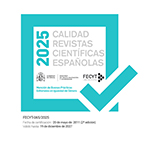Oriente islámico, esclavitud femenina y matrimonio en el México decimonónico. Una estrategia discursiva
Resumen
Mediante el análisis de la Crónica Parlamentaria, publicada paulatinamente por el diputado y escritor liberal Francisco Zarco, este artículo persigue comprobar cómo la contraposición discursiva a una otredad oriental permitió a los miembros del Congreso Constituyente mexicano de 1856 alcanzar determinados objetivos del programa político nacional, relativos a la libertad individual, la indisolubilidad matrimonial y el tratamiento de la tolerancia de cultos. Pone de manifiesto, además, la centralidad que el discurso orientalista tuvo entre las reacciones que los diputados protagonizaron frente un conjunto de representaciones femeninas, contrarias a la implantación del polémico artículo décimo quinto del Proyecto Constitucional, cuestionando la supuesta influencia clerical sobre estas mujeres y evidenciando otros medios de difusión de esta exotizada visión.
Descargas
Descarga artículo
Licencia
La Revista Complutense de Historia de América, para fomentar el intercambio global del conocimiento, facilita el acceso sin restricciones a sus contenidos desde el momento de su publicación en la presente edición electrónica, y por eso es una revista de acceso abierto. Los originales publicados en esta revista son propiedad de la Universidad Complutense de Madrid y es obligatorio citar su procedencia en cualquier reproducción total o parcial. Todos los contenidos se distribuyen bajo una licencia de uso y distribución Creative Commons Reconocimiento 4.0 (CC BY 4.0). Esta circunstancia ha de hacerse constar expresamente de esta forma cuando sea necesario. Puede consultar la versión informativa y el texto legal de la licencia.











